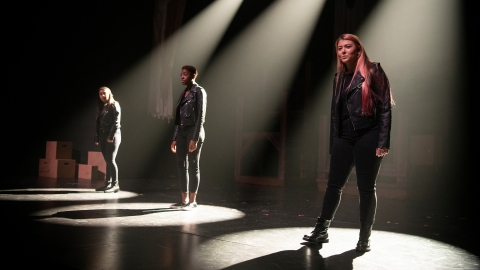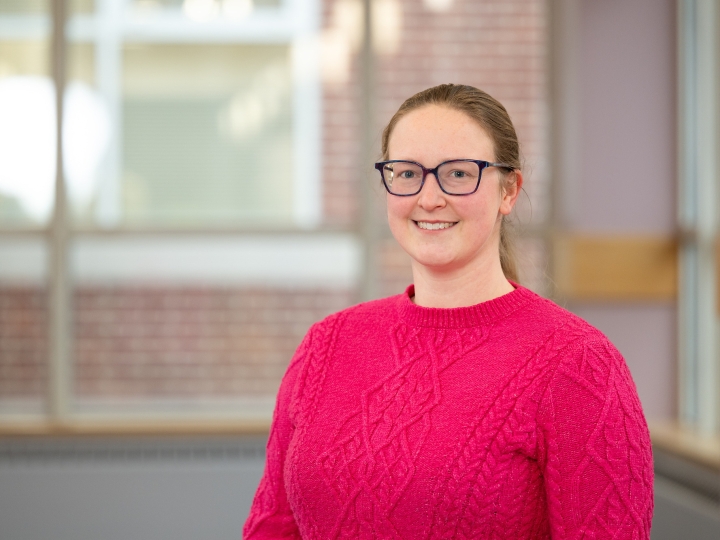
‘Unheard/Unspoken’ No More: Bucknell Students Explore Emotions in Student-authored Play
November 4, 2019
From left: Dana Pardee '22, Jeniah Martin '22 and Lydia Kappelmeier '21 play three Fates in "Unheard/Unspoken," a play they co-wrote alongside 24 classmates. Emily Paine/Communications
Tick, tick, tick. The lights go out, and the audience hears the second hand march toward the first day of college. Their faces illuminated in red, green and blue, first-year students express their concerns about beginning this new chapter.
"Will this place feel like home?"
"Will I find myself?"
"What if I run out of snacks?"
The thrilling, complicated, sometimes-scary journey of starting college forms the basis for Unheard/Unspoken, a new play written and performed by a group of 27 Bucknell University students.
Over the course of just two months, the students worked together to weave words, music, sets, lighting, props and costumes into an emotionally complex two-hour play perfectly suited to this moment in time.
Rather than performing someone else's words written years or decades ago, the students revealed their in-the-moment feelings, plucking issues from real life at their peak relevance.
The show follows a group of first-year students taking a creative writing class together at a fictional university. Their professor, Mr. Dean (played with deadpan brilliance by Dean Patterson '20, a theatre and anthropology double-major from Mercersburg, Pa.), encourages students to write about their feelings as a way to process them.
By telling authentic stories, Professor Dean explains, we can understand who we are and where we're going.
Sharing one's truth through art also describes the unique process of creating Unheard/Unspoken. The story of how the play was devised is just as vital as the piece itself.

Catherine MacKay '21 (front) was an assistant director for the play. Over the summer, she spent eight weeks completing research that formed the foundation for the show. Emily Paine/Communications
A Tale as Old as Time
For Catherine MacKay '21, a theatre major from Unionville, Conn., every play or musical in high school started the same way. A teacher would hand everyone a script, hold auditions and then stick to the original text as if it were chiseled in stone.
Consider Beauty and the Beast, where MacKay was cast in the lead role. MacKay knew there was only so much of herself she could bring to Belle — just like she knew the guy playing Lumière would use a French accent, and the girl cast as Mrs. Potts would talk like a polite British mother.
"That script already exists. You can't make any changes to it," she says. "There's an expectation of who those characters should be."
But at Bucknell, everything changed. MacKay was introduced to a creative process called devising, where performers collaborate to create an original product that reflects their experiences of the world.
Professor Anjalee Hutchinson, theatre & dance, directed the production and began by giving the students three themes for their devised piece: anxiety, loneliness and miscommunication. Then she challenged the students to look within and create "a mountain of moments."
At this stage, quantity outranked quality. A moment could be something as simple as "a character walks through a door, closes the door and sits down." Or it could be a few lines of dialogue between two characters. Or part of a song.
"And then you can piece those together," MacKay says. "I fell in love with it — how creative it is and how you work together with other people to create a beautiful piece of art."
Suddenly, MacKay discovered her passion for theatre extended beyond the spotlight's reach. For Unheard/Unspoken, she served as one of two assistant directors, helping guide the journey for her fellow students.
"You may think you know what you want to do and have your heart set on something, but definitely keep an open mind," she says. "Bucknell will open your eyes and make you realize you had strengths and capabilities that you never realized."

From left: Kat Swank '20, Mackenzie Gross '21 and Nina Limongelli '21 portray college students in "Unheard/Unspoken," a play they co-wrote alongside 24 of their classmates. Emily Paine/Communications
‘We Have, Actually, Nothing’
As liberating as devised theatre might seem, many students chose a different adjective to describe their initial reaction: "terrifying."
Drew Hopkins '20, a political science and theatre double-major from Newtown Square, Pa., says devising feels so experimental because it flips the script on how theatre traditionally works.
"A normal theatre process starts at the top, with your script," he says. "The director reads it, and they interpret what they're looking for. And then they pass on their interpretation down to the designers, and then, ultimately, to the actors.
"In devising, we're looking more horizontally. We don't have a text. We have, actually, nothing."
So they just started creating — not knowing or caring where the journey would lead. They had no script, no title, no characters, no cast. But they had the one thing they needed: each other.
As they created moments, some students found the process incredibly cathartic. MacKay says the journey helped her deal with difficult memories from her past, like losing her grandfather.
"I got to say the things that I never got to say by writing a little monologue for myself and performing it," she says.
Kate Donithen '20, a theatre and linguistics double-major from Dunkirk, N.Y., says this openness became contagious.
"Once you see somebody else being vulnerable in this super supportive community of people, it becomes much easier to be vulnerable," she says. "Even though we're using those vulnerable moments to create art, you don't feel used. It's like you feel seen."

Kyle Cohick '20 and Emma Saloky '21 share a moment onstage. After performing "Unheard/Unspoken" for audiences at Bucknell, the students hope the play will be selected for the Kennedy Center American College Theater Festival. Emily Paine/Communications
Feeling Seen
That feeling of being more than a face in the crowd has been present throughout Donithen's time at Bucknell.
In high school, she had an extremely specific set of requirements for college. She wanted a small liberal arts school in a college town, she wanted to study linguistics and she wanted to continue doing theatre.
"That really narrowed it down for me," she says.
In her first year at Bucknell, Donithen landed a role in the Shakespeare play The Comedy of Errors. Though the cast included a lot of sophomores, juniors and seniors, Donithen never felt left out. Again, she felt seen.
"You know how you go to school, and you're afraid that people are going to be like, 'Oh, you're a freshman?' But that never happened," she says. "Everyone was equal, and everyone was contributing."
When you don't put people into a box, incredible things can happen.
Cam Kittell '22 understands this well. The theatre major from Riverside, Conn., was a lacrosse and field hockey player in high school. On a whim during her junior year of high school, she decided to audition for the spring musical, Annie. She was hooked.
She knew theatre would be a huge part of her college experience, but she didn't want to feel restricted, tied down.
"What Bucknell offered, aside from the fact that they give money to art students, which is so rare, is that they allow me to study theatre while also taking management classes and science classes," she says. "I appreciated that so much."
This no-labels approach is what made Unheard/Unspoken so successful. With freedom to explore and innovate, the students created something nobody else could. And the audience stood up and cheered.
The Next Level
In December, the students learned that Unheard/Unspoken was chosen for the Kennedy Center American College Theatre Festival, a prestige reserved only for the finest shows.
After taking a moment to celebrate, they began rehearsing revisions, crafted using feedback from the show weekend.
They performed the new version of Unheard/Unspoken on Jan. 16, 2020, at the University of Maryland. The production received a standing ovation from the crowd of more than 600, and Bucknell took home the Golden Hand Truck Award, presented to the school with the best technical load-in and load-out.
While other schools separate their actors and their technicians, all of Bucknell's actors were involved in load-in and strike. That's mostly because at Bucknell, actors are also engineers, computer science majors, music majors, English majors, management majors and more.
"They have learned at Bucknell that they can be amazing actors and amazing technicians and amazing citizens and all the rest at the same time," Hutchinson says.

